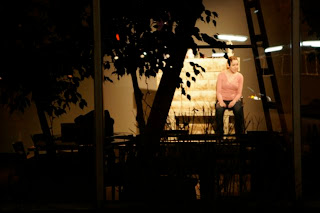Figures of Speech, a poem revisited
Tuesday, August 23, 2011
 In the early years of this blog, when I was writing and posting poems, I posted this one. It has become, over the years, one of the most visited posts on my blog; the vast majority of those who seek the page hail from the Philippines. Because "Figures of Speech," about the young man now headed off for his senior year of college, is still essentially true, I revisit it this afternoon.
In the early years of this blog, when I was writing and posting poems, I posted this one. It has become, over the years, one of the most visited posts on my blog; the vast majority of those who seek the page hail from the Philippines. Because "Figures of Speech," about the young man now headed off for his senior year of college, is still essentially true, I revisit it this afternoon.
Sometimes just a few white saucers will float down from the sky
and I want to wake you. Snow, I might say. Open your eyes.
Or somebody funny standing on a corner will, apropos of nothing,
throw a jigsaw dance, and I want to instruct, Now there’s a scene
for your next story, as if you were not already
looking through windows.
That’s the hardest part, for me, of getting old — remembering
your independence, asking your opinion before lamenting mine,
understanding that the way I happen to chase hawks at dawn
is something you’ve already made excuses for.
There were years of being your mother when your childhood
was the first childhood, when time was you trailing balloons,
the hat you wore, the afternoon we climbed the rocks in Maine
and squinted at the sun, and that was how I learned love and why
I could not foresee not waking you to snow,
to the first factor in a suburban metaphor.
Time isn’t then anymore. You leave when you want to,
you sing behind your door, you paper the table
with the morning’s news, and in the spaces in between
the instances you spend with me, I am assaulted by the memories
of my own first childhood. I calculate figures of speech at dawn.
I write until I bless us both with losses.


































